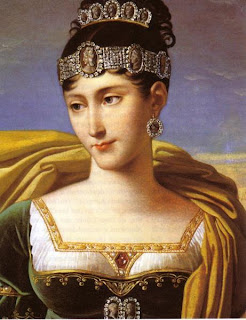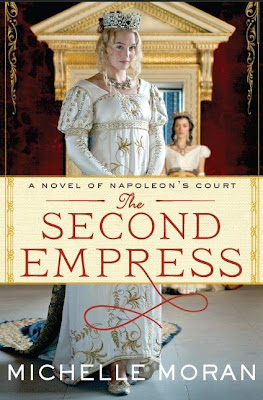Michelle Moran's fifth book has just been released (14th August) and I'm glad I had the chance to read it in advance receiving my review copy from NetGalley. It's a new brilliant tale set in those year I like to think of as The Regency - being more interested in English literature than French history - but set in France and Austria. It's a gripping tale of feelings and emotions which I wanted to share with you immediately after finishing it . That is now!
Synopsis of the book (from the author’s Official Site)
National bestselling author Michelle Moran
returns to Paris, this time under the rule of Emperor Napoleon Bonaparte as he
casts aside his beautiful wife to marry a Hapsburg princess he hopes will bear
him a royal heir.
After the bloody French
Revolution, Emperor Napoleon’s power is absolute. When Marie-Louise, the
eighteen year old daughter of the King of Austria, is told that the Emperor has
demanded her hand in marriage, her father presents her with a terrible choice:
marry the cruel, capricious Napoleon, leaving the man she loves and her home
forever, or say no, and plunge her country into war.
Marie-Louise knows what she
must do, and she travels to France, determined to be a good wife despite
Napoleon’s reputation. But lavish parties greet her in Paris, and at the
extravagant French court, she finds many rivals for her husband’s affection,
including Napoleon’s first wife, Joséphine, and his sister Pauline, the only
woman as ambitious as the emperor himself. Beloved by some and infamous to
many, Pauline is fiercely loyal to her brother. She is also convinced that
Napoleon is destined to become the modern Pharaoh of Egypt. Indeed, her
greatest hope is to rule alongside him as his queen—a brother-sister marriage
just as the ancient Egyptian royals practiced. Determined to see this dream
come to pass, Pauline embarks on a campaign to undermine the new empress and
convince Napoleon to divorce Marie-Louise.
As Pauline’s insightful
Haitian servant, Paul, watches these two women clash, he is torn between his
love for Pauline and his sympathy for Marie-Louise. But there are greater
concerns than Pauline’s jealousy plaguing the court of France. While Napoleon
becomes increasingly desperate for an heir, the empire’s peace looks
increasingly unstable. When war once again sweeps the continent and bloodshed
threatens Marie-Louise’s family in Austria, the second Empress is forced to
make choices that will determine her place in history—and change the course of
her life.
Based on primary resources
from the time, The SecondEmpress takes readers back to
Napoleon’s empire, where royals and servants alike live at the whim of one man,
and two women vie to change their destinies.
My book review
 |
| Marie Louise Hapsburg |
Very well-researched and historically accurate,
The Second Empress, Michelle Moran’s just released historical novel , has been
a delightful surprise for someone like me with no sympathy for the Bonapartes. As
many documents witness, the legend of Napoleon is very different from the reality of the man:
he was a military genius but the admirable skills he showed in the battlefield
weren’t extended to his personal life. He was a tyrannical person, a selfish, cynical , disrespectful lover and husband.
To write her account of Napoleon’s last 6 years
of reign, Michelle Moran relied on the thousands of letters that have
been preserved from his court, some of which are included in the novel. She
also used the memoirs of Marie – Louise, Hortense Beauharnais (Josephine’s
daughter), Madamoiselle Durand, Monsieur Montholon and Napoleon himself.
I particularly like the fact that the story is not
told by one narrator but three, and with a great choice of voices.
 |
| Pauline Bonaparte Borghese |
Three of the
protagonists lead the reader through the incredible turns of fortune in the lives of the Bonapartes,
three very different perspectives on the man, the emperor and the years which
led him to his final destiny: Pauline Borghese, Napoleon’s infamous sister who “was married to a Prince but had a
courtesan’s appetite for men” ; the second Empress herself, Marie-Louise of
Hapsburg, and Pauline's Haitian
chamberlain, Paul Moran, who might be in love with his mistress but whose
sympathies fall with Marie-Louise, who like him has to live missing and longing
her native country.
Michelle Moran is a skilled writer and her fifth
book is definitely worth reading . It is fast
paced but , at the same time it gives a sensitive in-depth of the
protagonist’s feelings and secret thoughts . It is an immersion into the
emotions which history text-books usually ignore. Furthermore, it is focused on how the female
part of that world experienced those
crucial events.
You can but feel compassion and admiration for
young Austrian princess Maria Lucia, forced into a marriage to a man both she and
her father despised:
“Austria had been beaten, her royal house
humiliated, and the Hapsburg Emperor had been forced to give his daughter to
the son of a petty Corsican nobleman” (p. 81)
 |
| Napoleon |
Though compelled to renounce her name (Napoleon
called her Marie-Louise), her lover Adam Neipperg, her beloved dog Sigi, her
dream of being loved and respected, she bore all of that with great dignity and
bravery and became the second Empress of France after Napoleon dismissed his
first wife, Josephine. Her life was at the whim of a capricious ruler used to
get things his way always and easily. She held on and her courage was rewarded
in the end.
You’ll be moved by Marie-Louise’s thread of the
story, especially when she fears for her son’s life (Napoleon preferred his own
son dead rather than brought up as an Austrian prince!) but you’ll also be fascinated by Pauline’s obsession for men, her brother and power and charmed by her Haitian chamberlain’s selfless loyalty to her , by his handsomeness as
well as by his romantic attitude to life and love.
On the author’s site you’ll find some excerpts , press reviews,
more details about the characters
and a Q/A post .

5 comments:
Thank you so much for taking the time to not only read the book, but to give it such a thorough and lovely review. I'm really honored, and so glad you enjoyed it!!!
Michelle
@Michelle Moran
Wow, Michelle! Welcome at FLY HIGH! It's such a surprise to see your lovely smiling avvie here!
It's been a pleasure to read "The Second Empress" and to know more about those years, events and historical characters.
You've done an excellent job: accurate research, gripping narration and compelling characterization.
Thanks for dropping by and leaving your comment.
Great review Maria! I have a review copy of this from netgalley that I plan on reading soon as like you, I'm a fan of Moran's work. I like the sound of having three narrators rather than just one.
@Sam
Yes, the choral perspective give the narration a pretty special complexity. I also loved the use of the "real" letters in the novel.
Looking forward to your review, then!
Thanks for visiting and commenting
:-)
Well, there's a negative legend about Napoleon too, as false as the 'hagiographic' one. I've read the book and I don't deny is a entertaining one. About the accuracy, sorry to disagree. A little research on Marie Louise will help the reader to difference fact - she married Napoleon and gave him a son - from fiction - a lot of things in this novel - , for example 'renouncing' to her name, which never was Maria-Lucia and by the way Napoleon called her Louise, which is how she chose to sign her letters to her friends before her marriage. Or being Neipperg's lover before her wedding. Or being a caring mother for her eldest son. Poor old Luisl - that's how her family called her - doesn't get many love from novelists. So this is a very original idea, but sadly the quantity of liberties taken made me frustrated. I would have prefered a novel more close to historical facts.
Post a Comment